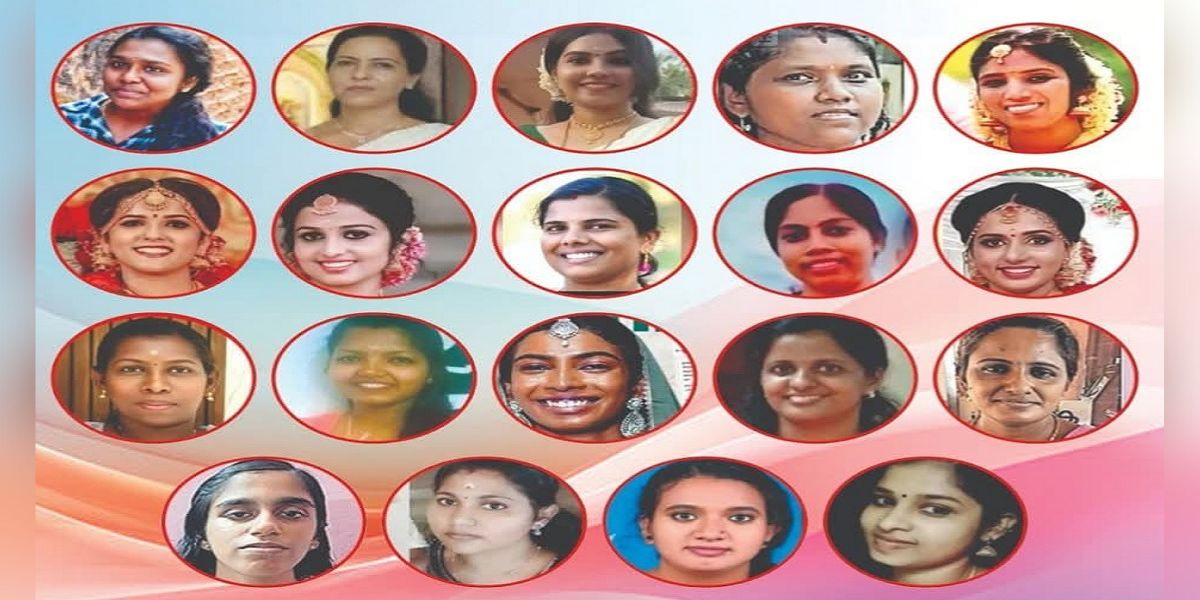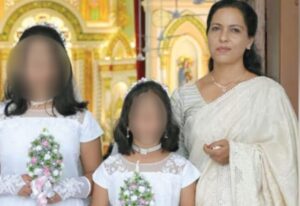Published Aug 21, 2025 | 9:00 AM ⚊ Updated Aug 21, 2025 | 9:00 AM

From February to the second week of August 2025, more than 19 educated married women chose death by suicide.
Synopsis: Recently, the number of women dying by suicide due to domestic violence and other forms of harassment has increased. Even the law meant to safeguard women has failed them so deeply that even their children became casualties of despair.
In Kerala, the land often praised as the face of progress and literacy, a horrific silence is spreading behind closed doors. From February to the second week of August 2025, more than 19 educated married women chose death by suicide.
However, the tragedy does not stop there. In 14 of those cases, mothers ended not just their lives, but also the lives of their nine innocent children, pulling them into rivers, in front of trains, or silencing them with poison, before following the same path.
These are not acts of madness in isolation.
They are acts of desperation born out of domestic violence, endless cycles of abuse, humiliation and control that stripped these women of every last ounce of hope. When the home becomes a battlefield, when law is too distant to protect, and when society is too indifferent to listen, death begins to appear as the only escape.
The Domestic Violence Act, 2005, promised women safety, dignity, and civil remedies against abuse, protection orders, residence rights, and monetary relief.
Yet, in reality, its protective umbrella has collapsed under weak enforcement and a lack of awareness. What was meant to safeguard women has failed them so deeply that even their children became casualties of despair.
Kerala must now ask itself: How did we reach a point where mothers believe their children are safer in death than in life? Why has domestic violence become so normal that women’s suicides, even with children, are reduced to mere routine headlines?

Shiny Kuriakose
On 28 February, Kerala was shaken by the death of Shiny Kuriakose (42), a nursing professional, who, along with her daughters Aleena (11) and Evana (10), ended her life by stepping in front of a train at Ettumanoor.
Investigations revealed that she had taken a loan of ₹3 lakh through Kudumbashree, partly to fund her father-in-law’s treatment and also for house renovation.
Barely weeks after the Ettumanoor tragedy, another chilling incident unfolded in Kottayam. Advocate Jismol Jose (34), a lawyer who had practised in the high court and Pala Court and had also served as vice president of Mutholy panchayat in 2019–20, was found dead along with her daughters, Neha (5) and Nora (2), in the Meenachil River.
According to police, Jismol is suspected to have injured herself before jumping in, while her children may have been forced to consume a toxic cleaning solution.
A brilliant lawyer, a devoted mother- yet Jisemol’s life was broken by years of colourism, abuse, and dowry harassment.
Both Shiny and Jismol were well-educated, talented, and respected women, one a nursing professional, the other a lawyer and local leader. They represented courage and capability in their own ways. Yet, their stories ended in silence and despair, taking their children along with them.
Suja Susan George, a social activist from Kerala, told South First that these incidents have shocked society, raising questions about what is happening inside our homes that forces even strong women to end their lives.
She pointed out that while earlier the focus was on financial independence and education as solutions, these tragedies point to something far more tragic and deeply serious.

Rima, Vipanchika and Athulya
In July, a series of disturbing cases highlighted the grim reality of dowry harassment among Malayali women. In Sharjah, 30-year-old Athulya Sekhar from Kollam was found dead in her apartment, with her family alleging brutal assault by her husband, Satheesh.
Just days earlier, Vipanchika Mani (33) and her one-and-a-half-year-old daughter Vybhavi were discovered dead in their flat in the same city, in what is suspected to be a murder-suicide.
A note, believed to be written by Vipanchika and later posted on Facebook, revealed years of abuse and harassment.
Back in Kerala, Reema ended her life along with her two-and-a-half-year-old son Rishivraj in Kannur, leaving behind a note that accused her husband Kamalraj and mother-in-law Prema of persistent cruelty and desertion.
The tragedies triggered widespread debates but little in terms of lasting solutions. In response, a collective of activists and women’s rights groups came together to form the Grahika Athikrama Prathirodha Samithi, a forum against domestic violence.
The initiative is led by journalist Geetha Nazeer and includes voices such as Suja Susan George, R Parvathi Devi, Mercy Alexander, CK Hameeda, Advocate PM Athira, Advocate Smitha K Krishnankutty, Advocate Girija Biju, and Liya, alongside established organisations like Sakhi and Anweshi, led by former Naxal Ajitha.
The forum aims to strengthen resistance against abuse and provide a collective front for justice.
Speaking to South First, Suja Susan George explained how the group formed out of fear and concern over rising domestic violence cases.
”When the numbers kept increasing day by day and no one-point solution was in sight, we realised this was an urgent issue that needed immediate attention. The system itself needs renovation and updates,” she said.
Women and Child Nodal Officer Ajitha Beegum IPS led a workshop that brought together victims, dedicated women’s help desks like Nirbhaya, and other stakeholders. However, gaps remain between these support systems.
Kerala has the highest number of Women and Child Protection Officers, yet each district typically has only one officer handling an average of 500–600 domestic violence cases per month, often without vehicles, staff, or sufficient funds.
There are also inadequate facilities to accommodate children from homes affected by domestic abuse or suicide, which contributes to women risking their lives while trying to protect their children. Some women may even see their actions as revenge against partners, an issue that also requires attention.
The group plans to identify victims, bridge connections with survivors, and provide proper legal and psychological support. Suja added, ”In many cases, the police handle domestic violence without the seriousness it demands. Their role is not to mediate but to take and probe cases thoroughly.”
The committee is now active in Thiruvananthapuram, Kollam, Kottayam, Ernakulam, and Kozhikode, with district committees established in each of these locations.
When South First spoke to Sreeja, an activist from Kozhikode and member of Anweshi, an NGO founded 32 years ago by former Ajitha, she said, “The main issue is that there is no democracy within families. Anweshi began addressing these problems decades ago when there were no proper government solutions.”
“Today, the government is also trying its best to provide assistance. We only know about reported cases, so the actual number may be double or more. Domestic violence is not a personal issue—it is a public and political issue.”
“Expanding networks will help women who suffer from domestic violence, and we hope that more support reaches them,” she added.
Parvathy Devi, an activist and member of the Forum Against Domestic Violence, told South First, “This is a multidimensional issue, and only a multidimensional approach can address it. Reporting must be factual and solution-oriented rather than emotional.”
“There is a tendency to imitate the actions of others who have suffered similar abuse, so reporting shouldn’t be based on sentiment. In many foreign countries, there are strict guidelines for reporting suicides, and such practices should be implemented here as well. We need solutions, not actions that cause further harm,” she said.
The tragic suicide of Shyni, who took the lives of her children before ending her own, was only the beginning — later, many mothers living under domestic violence followed similar paths. Experts warn that intense exposure to a single case of suicide can trigger copycat incidents and that widespread media coverage may sometimes worsen the situation.
When South First spoke to Jasmine S, a psychologist based in Kochi, she explained, ”Suicide emulation, or copycat suicide, occurs when an individual attempts suicide after being influenced by someone else’s death, often mimicking the method or circumstances. Media coverage amplifies this risk, especially when the act is sensationalised or romanticised, making it seem appealing to vulnerable individuals.”
She emphasised that every case of suicide requires careful handling. Awareness must be framed from the perspective of someone facing similar circumstances, presenting the tragedy not as a story to share, but as a warning or a call for support.
Unfortunately, the so-called Werther effect — where one suicide influences others — is often overlooked in discussions about domestic violence.
Sharing suicide notes, posting reels with melancholic music, or dramatising the incident, she said, not only disrespects the deceased but can also inadvertently encourage imitation.
(If you need support or know someone who has suicidal thoughts, please reach out to your nearest mental health specialist or contact the helpline numbers of suicide prevention organisations that can offer emotional support to individuals and families. Tele-MANAS: 14416; Life Suicide Prevention: 7893078930; Arogya Vani: 104; Sahay Helpline: 080-25497777; Roshni: 9166202000, 9127848584.)
(Edited by Muhammed Fazil.)

